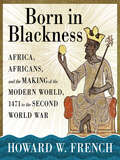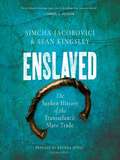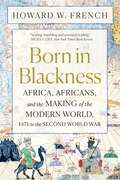Title search results
Showing 1 - 3 of 3 items

DAISY audio (Direct to player), DAISY audio (Zip)
Politics and government, History
Human-narrated audio
Traditional accounts of the making of the modern world afford a place of primacy to European history. Some credit the…
fifteenth-century Age of Discovery and the maritime connection it established between West and East; others the accidental unearthing of the "New World." Still others point to the development of the scientific method, or the spread of Judeo-Christian beliefs; and so on, ad infinitum. The history of Africa, by contrast, has long been relegated to the remote outskirts of our global story. What if, instead, we put Africa and Africans at the very center of our thinking about the origins of modernity? In a sweeping narrative spanning more than six centuries, Howard W. French does just that, for Born in Blackness vitally reframes the story of medieval and emerging Africa, demonstrating how the economic ascendancy of Europe, the anchoring of democracy in the West, and the fulfillment of so-called Enlightenment ideals all grew out of Europe's dehumanizing engagement with the "dark" continent. In fact, French reveals, the first impetus for the Age of Discovery was not-as we are so often told, even today-Europe's yearning for ties with Asia, but rather its centuries-old desire to forge a trade in gold with legendarily rich Black societies sequestered away in the heart of West Africa
Enslaved: The sunken history of the transatlantic slave trade
By Simcha Jacobovici. 2022
DAISY audio (Direct to player), DAISY audio (Zip)
History, United States history
Human-narrated audio
A riveting and illuminating exploration of the transatlantic slave trade by an intrepid team of divers seeking to reclaim the…
stories of their ancestors From the writers behind the acclaimed documentary series Enslaved, starring Samuel L. Jackson, comes a rich and revealing narrative of the true global and human scope of the transatlantic slave trade. The trade existed for 400 years, during which twelve million people were trafficked and two million would die en route. In these pages we meet the remarkable group Diving with a Purpose (DWP) as they dive for sunken slave ships all around the world. They search for remains and artifacts testifying to the millions of kidnapped Africans that were transported to Europe, the Americas, and the Caribbean. From manilla bracelets to shackles, cargo, and other possessions, the finds from these wrecks bring the stories of lost lives back to the surface. As we follow the men and women of DWP across eleven countries, Jacobovici and Kingsley's rich research puts into vivid context the archaeology and history of these vessels that were lost between 1670 and 1858. From the ports of Gold Coast Africa to the corporate hubs of trading companies of England, Portugal, and the Netherlands and the final destinations in the New World, Jacobovici and Kingsley show how the slave trade touched every nation and every society on earth. Though global in scope, Enslaved makes history personal as we experience the divers' sadness, anger, reverence, and awe as they hold in their hands tangible pieces of their ancestors' world. What those people suffered on board those ships can never be forgiven. Enslaved works to ensure that it will always be remembered and understood and is the first book to tell the story of the transatlantic slave trade from the bottom of the sea
Born in Blackness: Africa, Africans, And The Making Of The Modern World, 1471 To The Second World War
By Howard W. French. 2021
Braille (Contracted), Electronic braille (Contracted), DAISY Audio (Direct to Player), DAISY Audio (Zip), DAISY text (Direct to player), DAISY text (Zip), Word (Zip), ePub (Zip)
Biography, History, Politics and government
Synthetic audio, Automated braille
Revealing the central yet intentionally obliterated role of Africa in the creation of modernity, Born in Blackness vitally reframes our…
understanding of world history. Traditional accounts of the making of the modern world afford a place of primacy to European history. Some credit the fifteenth-century Age of Discovery and the maritime connection it established between West and East; others the accidental unearthing of the “New World.” Still others point to the development of the scientific method, or the spread of Judeo-Christian beliefs; and so on, ad infinitum. The history of Africa, by contrast, has long been relegated to the remote outskirts of our global story. What if, instead, we put Africa and Africans at the very center of our thinking about the origins of modernity? In a sweeping narrative spanning more than six centuries, Howard W. French does just that, for Born in Blackness vitally reframes the story of medieval and emerging Africa, demonstrating how the economic ascendancy of Europe, the anchoring of democracy in the West, and the fulfillment of so-called Enlightenment ideals all grew out of Europe’s dehumanizing engagement with the “dark” continent. In fact, French reveals, the first impetus for the Age of Discovery was not—as we are so often told, even today—Europe’s yearning for ties with Asia, but rather its centuries-old desire to forge a trade in gold with legendarily rich Black societies sequestered away in the heart of West Africa. Creating a historical narrative that begins with the commencement of commercial relations between Portugal and Africa in the fifteenth century and ends with the onset of World War II, Born in Blackness interweaves precise historical detail with poignant, personal reportage. In so doing, it dramatically retrieves the lives of major African historical figures, from the unimaginably rich medieval emperors who traded with the Near East and beyond, to the Kongo sovereigns who heroically battled seventeenth-century European powers, to the ex-slaves who liberated Haitians from bondage and profoundly altered the course of American history. While French cogently demonstrates the centrality of Africa to the rise of the modern world, Born in Blackness becomes, at the same time, a far more significant narrative, one that reveals a long-concealed history of trivialization and, more often, elision in depictions of African history throughout the last five hundred years. As French shows, the achievements of sovereign African nations and their now-far-flung peoples have time and again been etiolated and deliberately erased from modern history. As the West ascended, their stories—siloed and piecemeal—were swept into secluded corners, thus setting the stage for the hagiographic “rise of the West” theories that have endured to this day. “Capacious and compelling” (Laurent Dubois), Born in Blackness is epic history on the grand scale. In the lofty tradition of bold, revisionist narratives, it reframes the story of gold and tobacco, sugar and cotton—and of the greatest “commodity” of them all, the twelve million people who were brought in chains from Africa to the “New World,” whose reclaimed lives shed a harsh light on our present world.